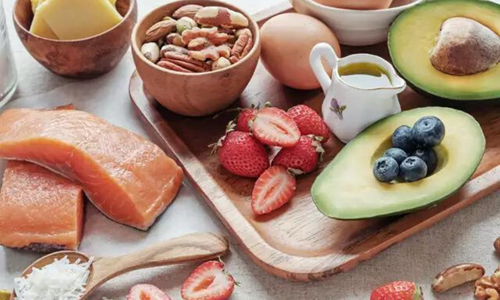


Polycystic ovary syndrome is a condition that causes hormonal imbalances and problems with metabolism. It can also lead to other serious health challenges, such as diabetes, cardiovascular problems, depression, and an increased risk of endometrial cancer.
Living with PCOS presents many challenges, both emotionally and physically. Since diet plays such a key role in this syndrome, there’s a lot you can do to help yourself. This is true whether you’re trying to lose weight, get pregnant, or you just want to feel better. If you’ve recently been diagnosed or battling your symptoms for decades, there’s reason to remain optimistic. You can take back control of your health and fertility by changing the foods you eat.
Many people with PCOS have insulin resistance. In fact, more than 50 percent of Trusted sources of those with PCOS develop diabetes or pre-diabetes before the age of 40. Diabetes is directly related to how the body processes insulin.
Following a diet that meets a person’s nutritional needs, maintains a healthy weight, and promotes good insulin levels can help people with PCOS feel better.
Women suffering from PCOS should avoid the following foods:
• Refined Carbohydrates (ex. white bread, pasta, and pastries).
• Processed sugary food (ex. cakes, candy, sweetened yogurt, ice creams with excess sugar).
• Fried foods, such as fast food.
• Sugary beverages, such as sodas and energy drinks.
• Processed meats, such as hot dogs, sausages, and luncheon meats.
• Solid fats, including margarine, and shortening.
• Excess red meat, such as steaks and hamburgers.
Foods to Add
• Healthy Fat-Rich Foods:
• Healthy Carbohydrate-Rich Foods:
• Healthy Protein-Rich Foods:
PCOS lifestyle changes to maintain a healthy weight and reduce symptoms
While diet is one of the best interventions for PCOS, other lifestyle changes are well known to improve health outcomes further.
Meal timing
Spreading your meals and snacks throughout the day (that is, eating roughly every 3-4 hours) can help balance your blood sugar and insulin levels. This means eating 3 meals (breakfast, lunch, and dinner) and 2 snacks in between for most people.
Exercise
It’s well known that physical exercise improves insulin sensitivity and body composition in women with PCOS. Aerobic exercise reduces inflammation, while resistance training improves sex hormone balance. Exercise can also reduce anxiety and depression.
Sleep Poor
It’s known to affect insulin resistance in women with PCOS. Better quality sleep can improve food choices, and reduce the desire for sugary foods.
Stress management
Stress increases inflammation and reduces insulin sensitivity. This makes it a significant risk factor in the development of type 2 diabetes and heart disease. Reducing stress is likely to further add value to a PCOS-friendly lifestyle.